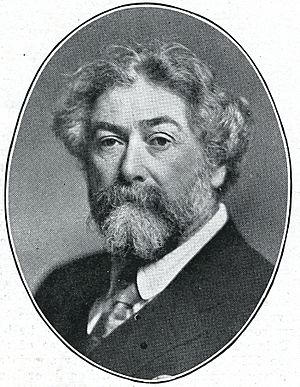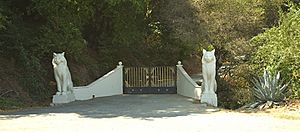Charles Erskine Scott Wood facts for kids
Quick facts for kids
Charles Erskine Scott Wood
|
|
|---|---|

Wood c. 1910
|
|
| Born | February 20, 1852 |
| Died | January 22, 1944 (aged 91) |
| Nationality | American |
| Other names | C.E.S. Wood |
| Citizenship | United States |
| Alma mater | United States Military Academy |
| Occupation | Author, attorney, soldier, lawyer, satirist |
| Known for | Heavenly Discourse |
| Political party | Democratic |
| Spouse(s) | Nanny Moale Smith, Sara Bard Field |
| Children | Nan Wood Honeyman, Erskine Wood I |
Charles Erskine Scott Wood, also known as C.E.S. Wood (born February 20, 1852 – died January 22, 1944), was an American writer, artist, and soldier. He was also a lawyer who worked to protect people's civil liberties, which are their basic rights and freedoms. He is most famous for his 1927 book, Heavenly Discourse, which was a popular satirical book. Satire uses humor and exaggeration to make a point about something.
Contents
A Young Soldier's Life
Charles Wood was born in Erie, Pennsylvania. He went to the West Point and graduated in 1874. After graduating, he became a lieutenant in the army.
He fought in the Nez Perce War in 1877. This was a conflict between the United States Army and the Nez Perce people. Wood was present when Chief Joseph, the leader of the Nez Perce, surrendered. Wood wrote down Chief Joseph's famous speech. The speech ended with the powerful words: "My heart is sick and sad. From where the sun now stands, I will fight no more forever." Charles Wood and Chief Joseph became good friends after this.
Wood later lived in Portland, Oregon, with his family. His home was near where the Vista Bridge is today. A famous journalist named John Reed grew up nearby and was greatly influenced by Wood.
A Lawyer and Writer in Oregon
After his time in the army, Wood became a well-known lawyer in Portland, Oregon. He often defended labor unions and people who had different political ideas. He started writing and became a regular writer for The Pacific Monthly magazine. He was also a key figure in Portland's writing community.
In 1896, Wood was Oregon's representative for a part of the Democratic Party. This group supported specific economic ideas at the time.
Wood also joined the American Anti-Imperialist League. This group believed the United States should not take over other countries. They wanted the U.S. to give independence to places like the Philippines after the Spanish–American War.
Fighting for Freedom of Speech
As a lawyer in the early 1900s, Wood stood up for people who were often seen as rebels. For example, he represented Emma Goldman, a famous activist. He wrote articles for magazines that supported radical ideas, such as Liberty and Mother Earth.
Wood strongly believed that the government should not have too much power. He spoke out for civil liberties, which are the rights of people to express themselves freely. He also opposed imperialism, which is when a country extends its power over other lands.
In his 1927 book Heavenly Discourse, he wrote about how he felt the government was growing too big. He believed that the freedom of ordinary people was disappearing because of this.
An Artist and Painter
Wood was not only a lawyer and writer, but also an artist. He supported Native Americans and painted many pictures of them. He loved painting landscapes and interesting places along the Oregon and California coasts. He also painted his favorite spots in watercolor, like Keats' grave and views from his home in Los Gatos, California.
He mainly used watercolor paints and graphite pencils for his art. The Huntington Library has many examples of his artwork online.
Later Life and Friends
From 1925 until he passed away in 1944, Wood lived with his second wife, Sara Bard Field, in Los Gatos, California. Their house was called "The Cats" or the "Cats Estate." It was built in 1925 on a large property. The entrance had a special iron gate with two big white cat sculptures named Leo and Leona. Many famous people visited their home, including Charlie Chaplin, Eleanor Roosevelt, and John Steinbeck.
Wood had many well-known friends, including photographer Ansel Adams, lawyer Clarence Darrow, activist Emma Goldman, and writer John Steinbeck.
When he died, Charles Wood was the oldest living graduate of West Point. He was also the father of Nan Wood Honeyman, who became Oregon's first woman to serve in the U.S. Congress.
In Film
Charles Wood was played by actor Sam Elliott in the TV movie I Will Fight No More Forever. In the film, he is shown as a United States captain who takes part in the Nez Perce War.
 | Audre Lorde |
 | John Berry Meachum |
 | Ferdinand Lee Barnett |


